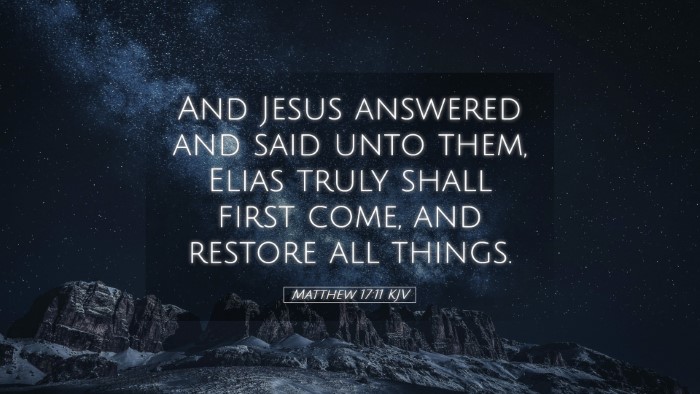Matthew 17:11 - Commentary Summary
Verse: "And Jesus answered and said unto them, Elias truly shall first come, and restore all things."
Contextual Overview
This verse is part of the narrative where Jesus is responding to His disciples following the transfiguration. They had questioned Him about the prophecy of Elijah's return and His teachings regarding the coming of the Messiah. The preceding verses indicate a time of confusion and inquiry from His disciples as they were grappling with the implications of the events they had just witnessed.
Interpretive Insights
The reference to Elijah (Elias) carries significant theological weight. In the Jewish tradition, Elijah is seen as the prophet who would return before the coming of the Messiah. This expectation is rooted in Malachi 4:5-6, which states that God will send Elijah before the great and terrible day of the Lord. Judges and interpreters throughout history have examined the implications of Elijah’s coming as a precursor to significant spiritual renewal.
Matthew Henry's Commentary
Matthew Henry emphasizes the prophetic fulfillment and restoration that Elijah's coming signifies. He notes that Elijah’s return is not merely a literal comeback but represents a dynamic restoration of faith and righteousness within the people. Such restoration includes a turning away from sin and a renewed focus on God's covenant with His people.
Henry also suggests that Jesus identifies John the Baptist as the fulfillment of this Elijah-type prophecy. John’s role was to prepare the way for Jesus, reflecting the prophetic tradition of calling the people back to repentance.
Albert Barnes' Commentary
Albert Barnes provides a systematic examination of this verse and highlights the importance of Elijah in eschatological terms. He explains that the Jewish understanding of Elijah is deeply rooted in the various prophetic texts, where he functions as a forerunner. Barnes articulates that the coming of Elijah entails not only a restoration of Israel but also an invitation to faith for all nations.
Furthermore, Barnes elucidates the notion that this 'restoration of all things' implies a comprehensive re-establishment of true worship and the correct understanding of God’s will, which had been distorted over time. He asserts that the coming of Elijah (reflected in John) and Jesus both served to bring about this restoration.
Adam Clarke's Commentary
Adam Clarke expands on the significance of the restoration mentioned in the verse. He relates it to the transformative power of the Messiah’s ministry. Clarke identifies the 'restoration of all things' not only as spiritual renewal but also as a broader societal transformation. He points to the overarching narrative of redemption, wherein all creation longs for restoration through the Messiah.
Moreover, Clarke connects Elijah’s coming with the broader prophetic theme of reconciliation between God and humanity. He argues that this verse encourages believers to engage in the work of restoration and reconciliation reflective of Christ’s ministry.
Theological Implications
The verse encapsulates vital theological tenets that are significant for pastors, scholars, and laypeople alike. The implications of Elijah’s return resonate throughout Christian teaching, underscoring the themes of fulfilling prophecy, repentance, and restoration.
- High Christology: This passage reveals the divine nature of Christ as the one who not only fulfills prophesy but also brings redemption.
- Human Response: The call for repentance and restoration remains relevant, challenging believers to reflect on their spiritual state.
- Missional Aspect: The emphasis on restoration speaks to the Church's mission today, inviting believers to partake in God’s restorative work in the world.
- Eschatological Expectation: The restoration implies hope for future fulfillment in the eschaton, encouraging believers to await Christ’s return.
Conclusion
Matthew 17:11 is a profound verse that invites us to reflect on the narrative of God’s redemptive history through the lens of prophecy. By understanding the prophetic significance of Elijah and the call to restoration, we are reminded of our mission as followers of Christ in a world that continuously longs for hope and renewal. It serves as a call to engage actively in God's purpose, looking forward to the complete restoration that is to come.


